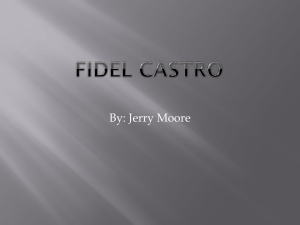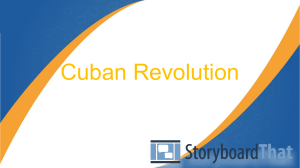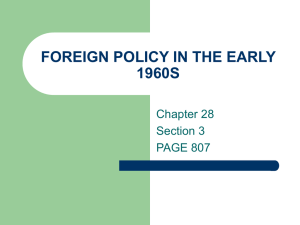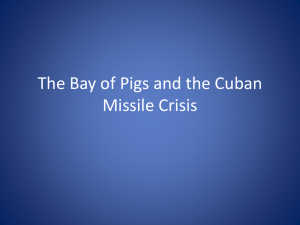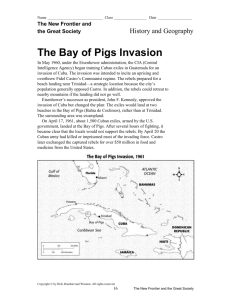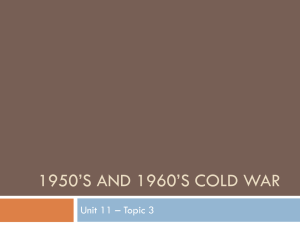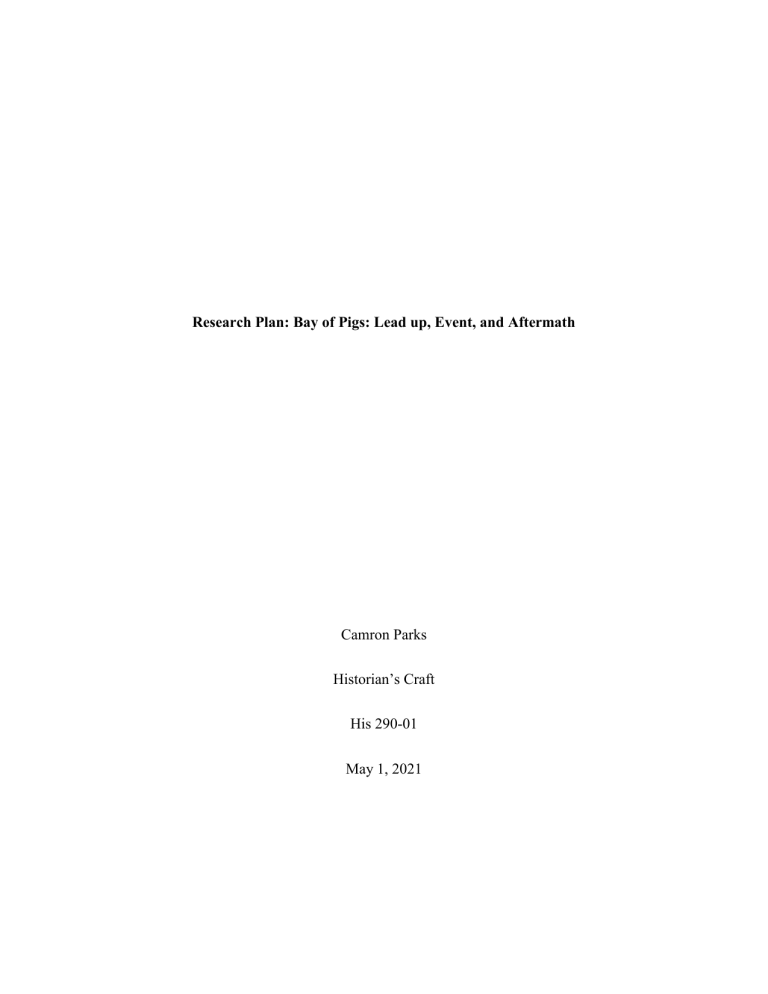
Research Plan: Bay of Pigs: Lead up, Event, and Aftermath Camron Parks Historian’s Craft His 290-01 May 1, 2021 The way JFK handled the Cuban Missile Crisis, can be directly linked back to the failure of intelligence that was the Bay of Pigs invasion, a plan two presidents in the making and still, with the greatest intelligence committees in the world, the U.S. suffered possibly it’s largest hit to its pride and prestige since the British burned down the White House in 1812, why did this happen, who’s to blame, and what happened afterwards in the wake of failure? What I hope to accomplish with this paper is simple, I want to detail a comprehensive view of the events leading up to the Bay of Pigs, the Invasion itself, and the ramifications of its failure, and I want to be able to tie it all together in a way that makes sense. I would say the best way to go about researching this topic would to look at it from an American view point, a Cuban viewpoint and maybe even an outside country’s viewpoint, I want to be able to look at the problems it caused America after the failure, and the Intelligence in America before the invasion which ultimately led to the failure itself. Looking at the Cuban side would let me in on the intelligence they had before the invasion, if they had any and how they were able to fend of this invasion. For the world side of it knowing how the rest of the world viewed the failure by America and how it viewed Cuba will do good for research, it will make sure I keep an unbiased view of events. Research for this particular subject would be very primary source heavy, there are so many declassified documents and memoirs written from soldiers and intelligence officers who were involved in this that you would have a field day with all the information you could get from these sources. Using books that talk about the Cold War in general would be beneficial as it would help me get a sense of the world after the failure at the Bay of Pigs, an element that would be important in my paper. Books on President Kennedy would be helpful too, as getting to know the man, and the people around him, who were at the helm of this operation could give me a glimpse into why it failed. There are many archives and such that I can use, the CIA has a while website for you to go and read declassified documents, so that would definitely be one I use, what better way to see way we saw the invasion unfold than with the documents written by the intelligence officers who saw it happen and were getting first hand reports. The National Security archive would be a very helpful source of knowledge, as it would have reports from other sources outside of the intelligence committees, like reports from the Joint Chiefs and reports from the NSA and other agencies that would have been involved, and it would give me a sense of the things going on back on home soil during the invasion and any other threats present that would have presented themselves during said invasion that needed the focus of everyone. Getting access to the Cuban National archive would also be very beneficial, though I would suspect much harder to get access to since I am an outsider and I believe we still don’t have very strong relations with Cuba, even 60 years later and after the death of Castro, gaining access to the Cuban archive would allow me to find information detailing the Cuban side of the invasion, it may give me more info on the exiles that were used as the attacking force, and would give me more insight into the Castro regime at the time and directly after the invasion. Secondary sources I may use in this paper would be biographies of people involved, like Kennedy biographies to better understand the President, which might help me understand his decision making on the issue of the invasion better, books describing the invasion using declassified documents and interviews and things of that nature would help me build a comprehensive timeline of events to help me have a clear understanding of when things started shifting the opposite way of how the US wanted them to go. Sources describing Kennedy’s relationship with his intelligence agencies would also be an invaluable asset., knowing why Kennedy distrusted them would again possibly help paint a clearer picture as to why things to go so belly up during the invasion. Books about the Cold War in general would be very helpful sources as they could offer a wider range of understanding on how the world, allies and enemies alike, reacted to the invasion, which would then help understand how America reacted after its massive failure. My project isn’t revolving around an issue per say, but the way I would frame what I am researching is trying to find the events that led up to the Bay of pigs, the event itself and the aftermath of the invasion, and try to tie them all together on how they effected the Cold War in the immediate time frame. before and after Problems that could show up if I was researching this are, like I said before, gaining access to archives, especially national ones is hard enough, trying to gain access to the Cuban National Archive sounds like a tall task. Repetitive sources could become a problem, not because people don’t make it interesting, but because the consensus is it’s a failure and there isn’t much more you can add onto that, that hasn’t already been done. Trying to find unique sources is going to be hard. Not going down a Kennedy rabbit whole will be hard for me, it’s hard not to want to talk about the Cuban Missile Crisis and his assassination and all the things in between, at least for me. Nothing worth doing is easy, which is why I’m finding this to be difficult, but this invasion is a topic worth researching, and worth researching thoroughly. Timeline Jan 1, 1959 – The 26 of July movement led by Castro, succeeds in overthrowing General Fulgencio Batista and forcing him into exile. Jan 7, 1959 – Washington recognizes the new Cuban government. Late October 1959 – Eisenhower approves a program to back elements in Cuba that are opposed to the new Castro regime. Jan 1960 – The CIA sets up a task force to implement Eisenhower’s new Cuban program to try to overthrow the Castro Regime Jan 12 – Throughout the month of January small bombing raids and sabotage increase throughout the whole of Cuba. Feb 21 – Police detain Cuban resistors trying to throw hand grenades at the Havana Carnival. Mar 1960 – The CIA starts training 300 Cuban guerilla fighters. Mar 17 – Eisenhower, in the Oval, approves the new plan “A Program of Covert Action Against the Castro Regime.” Apr 19 – A group of Cuban resistors plotting sabotage in Cuba are arrested. May 7 – American planes and ships draw closer to Cuban mainland. May 16 – The US welcomes new Cuban ambassador Jose Miro Cardona May 31 – Cuban internal security round up members of an internal resistance force Jul 23 – The CIA director updates President Hopeful John F. Kennedy on the situation Aug 5 – Cuban forces capture 112 contra forces including and American. Sep 15 – Cuban forces arrest a group of North Americans including 2 U.S. Embassy Workers Sep 18 – JFK is updated again. Sep 28 - The CIA attempts its first drop of weapons and supplies to the Cuban resistance groups. Oct 16 – JFK lambasts Eisenhower’s Cuba policy Dec 6 – Eisenhower meets with President Elect Kennedy to discuss the Cuba strategy and plan. Dec 12 – American planes fly above Cuba and drop anti-Castro propaganda. Jan 1, 1961 – Recruitment of Cuban exiles is greatly increased. Jan 25 – Kennedy meets with the Joint Chiefs. Jan 28 – Kennedy receives his first briefing as President on the Cuba situation. Feb 8 – Kennedy receives a memo highlighting the difference of opinion on the Cuba situation from various agencies. Feb 13 – Militia forces in Cuba intercept cargo. Apr 1 – Joint Chiefs approve the rules of engagement. Apr 4 – Kennedy holds a poll meeting with the state department on whether or not to move on with the engagement, after hearing the opposing view, all vote in favor of proceeding. Apr 6 – Kennedy questions the CIA officials on whether or not a preliminary airstrike would be beneficial or if it would alarm the Castro regime. April 17 – The invasion begins. April 19 – The invasion officially ends in failure. Primary Source #1: Intelligence Debrief 4/17/61 https://www.cia.gov/readingroom/docs/CENTRAL%20INTELLIGENCE%20BULL%5B158157 46%5D.pdf - Focuses on more than just Cuba, but I picked one that was the day of the invasion. - Castro Regime reacted with alarm to US bombings of three Cuban airfields 2 days before - Castro mobilized his 200,000-man militia and made charges at the UN embassy - The airstrikes were meant to reduce the potential of an already subpar Cuban airforce. - Debrief mentions the Anti-Castro Cuban Revolutionary Council announced that an invasion of Cuba has been carried out by Cuban liberation forces. - It’s odd that the day of the invasion the President only gets one paragraph on the most pressing situation - The lack of focus on Cuba from his debriefs makes me understand why Kennedy distrusted his intelligence committees, or maybe his lack of care for what was happening in Cuba - Cuban radio station reports that a landing has been made in the central Cuban province of Matanzas, and that Cuban militia had called for reinforcements o This tells me the landing worked at first and caught the Cuban forces off guard Primary Source #2: Intelligence Debrief 4/19/61 https://www.cia.gov/readingroom/docs/CENTRAL%20INTELLIGENCE%20BULL%5B158156 17%5D.pdf - Again Cuba is only given a small amount of time compared to things like Vietnam and Khrushchev - Reports that Castro’s forces are buoyed by tanks, air, and artillery. - Report indicates that there was no sign of a general population uprising against Castro, which according to this debrief was what the anti-Castro forces had counted on for support o Seems like a lot of luck and faith was needed to believe that - Report says that many Latin-American leaders were sympathetic towards the Anti-Castro fighters, and demonstrations were taking place in countries like Costa Rica, and Panama o This invasion was for more than change in one country, if Castro fell the hopes of Latin America would’ve been revitalized, Communism was no longer knocking on their door - The tone of this debrief was definitely one of uncertainty of making through a long drawn out process let alone another day of fighting - Debrief stats that the next 2 or 3 days of fighting will be critical o Debrief says Soviet MIGS were used against Anti-Castro forces o Definitively tying Russia to Cuba? Primary Source #3: Memorandum from Kennedy Aide Richard Goodwin 8/22/61 https://nasarchive2.gwu.edu//bayofpigs/19610822.pdf - Conversation took place August 17, 1961 at around 2 A.M. - Many delegates from Brazil and Argentina had been trying to arrange a meeting with Che’ Guevara and Goodwin - This memo is a summary of that meeting - Speaks about now being out of the US’s sphere of influence, which Guevara says is irreversible - Che speaks about how hard it would be to topple Cuba from the inside o What they hoped would have happened during the Bay of Pigs - Che thanks Goodwin and the US for the invasion (Bay of Pigs) stating that it had been a great political victory for him o He said it helped his forces consolidate o And that the invasion transformed them from an aggrieved little country to an equal Not how I would see it, but from his perspective I can see why he felt that way, they beat a US backed force - Since this was a memo for the president I have to assume that Goodwin was as detailed about his conversation as he could possibly be - Weird seeing a hostile diplomat talk in such a casual way with the aide of the President of the United States. Bibliography 1. Rasenberger, Jim. The Brilliant Disaster: JFK, Castro, and America's Doomed Invasion of Cuba's Bay of Pigs. ( New York, NY: Scribner, 2012.) - Rosenberger takes a close look into the reasoning of Kennedy’s reasoning before and during the Bay of Pigs invasion, this is a inner look to Kennedy. Rosenberger adds the personal Kennedy angle, and looks at the Invasion through the lens of failure. Having a close look into Kennedy will help me have a more comprehensive view of the inner workings of the Bay of Pigs. 2. Jones, Howard. The Bay of Pigs. (New York, NY: Oxford University Press, 2010.) - Howard provides and inclusive look into the disaster that was the Bay of Pigs. He looks at recently declassified CIA documents, he examines the series of missteps that led to the failure, and he uses declassified CIA documents to do so. Having the knowledge pf the CIA documents will help me track the specific steps that ultimately led to failure 3. Carradice, Phil. Bay of Pigs: CIA's Cuban Disaster, April 1961. (Barnsley, South Yorkshire, UK: Pen & Sword Military, 2018.) - Carradice talks about the impact the failure had on the intelligence committee’s and the United States prestige. Carradice talks about the Cuban exiles in his book. The more I have knowledge of the events leading up to and during the Bay of Pigs, the better. 4. Charles Rivers Editors. The Bay of Pigs Invasion: President Kennedy’s Failed Attempt to Overthrow Fidel Castro. (CreateSpace Independent Publishing Platform, 2014.) - This books provides an overview of the invasion, the why and how from both sides. The book uses declassified CIA documents and uses sources from the Cuban side of the short conflict. This will help because it provides a side of the story that is rarely talked about, the Cuban side. 5. Fink, Carole K. Cold War: an International History (Boulder, CO: Routledge, 2018.) - Fink offers a comprehensive overview of the Cold War with this book, going from the start to the fall of the Berlin Wall. Using both recently declassified and public documents to connect all the events. Knowing what was happening in other parts of the world right before, during, and right after the Bay of Pigs will help me write a more comprehensive paper. 6. Higgins, Trumbull. The Perfect Failure Kennedy, Eisenhower, and the CIA at the Bay of Pigs (Canada, ON: Penguin Books, 1987) - Trumball offers a look at what the result of the Bay of Pigs did and how it did and could affect America in the rest of the world. Using all available knowledge from before 1987. Knowing the effects of the failure on our standing and decision making in the rest of the world will help me connect the Bay of Pigs to later American endeavors. 7. Castro, Fidel, and Ramón Fernández Piloto José. Playa Girón: Bay of Pigs ; Washington's First Military Defeat in the Americas. (New York, NY: Pathfinder, 2001.) - This provides both the American Perspective and Cuban perspective. Maps and other images and a chronological map of what happened. Having a clear idea when every big even happened will help me. 8. Rodriguez, Juan Carlos. The Bay of Pigs and the CIA: Cuban Secret Files Reveal the Story behind the 1961 Invasion. (Melbourne, AUS: Ocean, 1999.) - Rodriguez offers the Cuban side of the intelligence to coin this book. Rodriguez uses recently declassified Cuban counterintelligence in this book. This will help by giving me a comprehensive look at what Cuban intelligence was saying about the invasion leading up to it. 9. Sorensen, Theodore C. Kennedy: the Classic Biography. (New York, NY: Harper Perennial Modern Classics, 2013.) - Sorensen offers a comprehensive look into the life of former President Kennedy. He doesn’t offer anything new per say. Having a look at Kennedy will help me better understand where his mind was and what led to him making the decisions he made during the invasion 10. O'Brien, Michael. John F. Kennedy: a Biography. (New York, NY: Griffin, 2006.) - O’Brien offers a new look on Kennedy in this biography, using newly released governmental archive documents. Him using newly released documents is what he offers. Having a look at Kennedy will help me better understand where his mind was and what led to him making the decisions he made during the invasion
